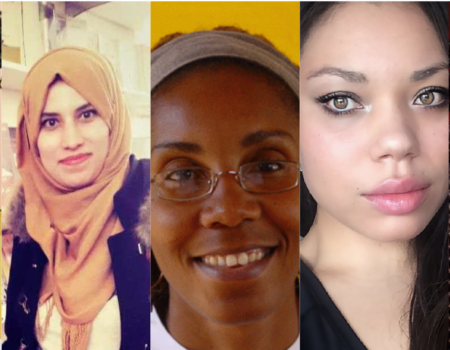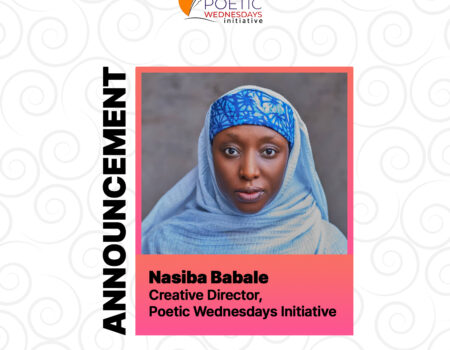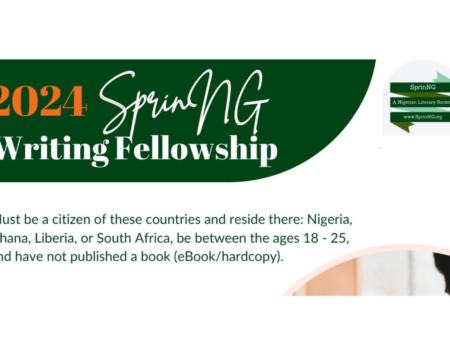“Children should be introduced to literature at an early age. The magic of the written word should not be reserved for the adult alone.” – Chinua Achebe
This cogent saying rings especially true for 2024 JAY Lit Prize for Fiction winner and our July 2025 Spotlight writer, Chidera Nwume.
The magic came to her in Mende, Lagos, where she grew up and where electricity was often unreliable. During primary school summer breaks, with little else to do, she spent her time reading and daydreaming. Books became her escape and inspiration—feeding her imagination and nudging her toward storytelling. She read ThisDay Style magazines, Enid Blyton collections, Jacqueline Wilson books, and others that have since blurred into memory. Her home was also filled with books; her father had once been an avid reader and her mother, a lawyer, had a sizable collection. She still remembers the first “adult” book she read—The Grass is Always Greener Over the Septic Tank by Erma Bombeck—its cover art and the familiar, comforting scent of well-loved pages stained in a warm, brownish-yellow hue.

During the school term, she could often be found in her primary school’s generously stocked library. At first, she borrowed one book a week—then two, once the librarian saw how responsible she was. She adored the Rainbow Magic series about colourful fairies and the Dear Dumb Diary collection. Scholastic Inc. pop-ups and book fairs at school were highlights she eagerly anticipated.
Her first deep feeling toward writing wasn’t love—it was anger. In Primary 5, she received an 8.5/10 on an essay, an unusually high score for her school. When she reported it to her teacher, he was skeptical and escorted her (and another student said to have the highest score) to the Primary 6 teacher who had done the grading. Despite seeing the clearly written 8.5, that teacher insisted it must’ve been a mistake—perhaps a 5.5 instead. Quiet and non-confrontational, she didn’t challenge the decision, but internally, she was furious. That moment sparked an unrelenting persistence in her to keep writing, initially out of spite—and eventually, out of love.

In primary school, she created a small, handmade cookbook called Food for Thought, filled with her own drawings. She enjoyed the tactile experience of putting it together using yellow cardboard and notebook paper. The first full story she wrote was titled ‘Down in Under’ (she lightly jokes about the simplicity of the title as she was only 9)—a tale of a girl who discovers she’s a mermaid. Though short and simply illustrated, it marked the beginning of her storytelling. By JSS1, she was filling entire notebooks with stories and illustrations she mostly kept to herself, continuing until SS2, when mental health challenges silenced her creativity for two years.
One of her most formative influences came in the form of a story written by her school senior, Ayoola. She discovered the handwritten story during her JSS3 BECE extension and was immediately captivated. Though they weren’t friends at the time, Ayoola’s characters and honest writing left a lasting impression. Nearly a decade later, they met again at a birthday picnic, where she nervously shared one of her own stories. Today, Ayoola remains a strong inspiration in her writing journey.

Beyond that, inspiration comes from everywhere: TV shows, overheard bus conversations, books, her siblings, a breeze, a mischievous cat, or even a disappointing burger. Her writing is shaped by an insatiable curiosity and deep engagement with the world’s sensory offerings. As long as there are things to see, hear, feel, taste, or smell—she’ll continue writing.
She rereads Purple Hibiscus by Chimamanda Ngozi Adichie every year, grateful for what that book awakened in her. She devours Akwaeke Emezi’s works—The Death of Vivek Oji was consumed in a single night. Chinua Achebe’s writing grounds her; his prose and poetry feel like deep roots or a distant rumble. Ayobami Adebayo’s Stay with Me is one of the most honest and tender stories she’s ever read. After reading Tony Tulathimutte’s Rejection, she declared him her literary role model—convinced the book will someday become a classic.

After SS2, she transferred schools and began dating someone from SS3 into her first year of university. As a Valentine’s gift, she wrote something for him—driven by romance and emotional impulse. She had nearly forgotten she was a writer until the ease of crafting that piece reminded her. Encouraged by friends and family, she launched a blog and published the letter as her first post. Her boyfriend thought it was cheesy and asked her to take it down. They broke up not long after—and she reunited with her writing for good. Love, it turns out, was her creative compass.
One of her proudest and most surprising moments was co-winning her graduate school’s 2025 Commencement Poetry Competition. Despite not considering herself a poet, she took a Meditation and Poetics class during her MFA and wrote a piece about the anxiety in her home during the 2024 U.S. election results. Her professor encouraged her to submit it. When she received an email saying her poem had moved the judges so deeply that they awarded two winners instead of one, she was stunned. The recognition helped her remember her talent—especially in a genre she usually avoids. It became proof that if she could succeed in unfamiliar territory, she could thrive in her chosen genres too.

As a proud member of the Inconsistent/Unorthodox Writers Club, she admits she doesn’t always know what’s next. A collection of short stories currently lives on her laptop—some of the stories published, others still seeking homes. She plans to apply for fellowships that can provide her with the time, space, and funding to write. While she hasn’t yet felt the spark for a full-length novel, she trusts it will come in its own time—and encourages readers to be patient alongside her.
Nwume’s goal is simple yet limitless: to be the best writer she can possibly be. If there are limits to what a writer can do or become, she intends to exceed them. She dreams of crafting work that outlives her many times over—stories that will continue to speak, breathe, and matter long after she’s gone.





Bongiwe T. Maphosa
Bongiwe Maphosa is a budding author with a passion for storytelling. With her thought-provoking narratives, she takes her readers on a literary adventure. Bongiwe's works on the human condition from a fresh perspective have earned her recognition and publications in the Avbob Poetry Anthology of 2019, The Writer's Club of South Africa 2021, and JAY Lit in 2021. She hopes to cement her place in the literary community.





